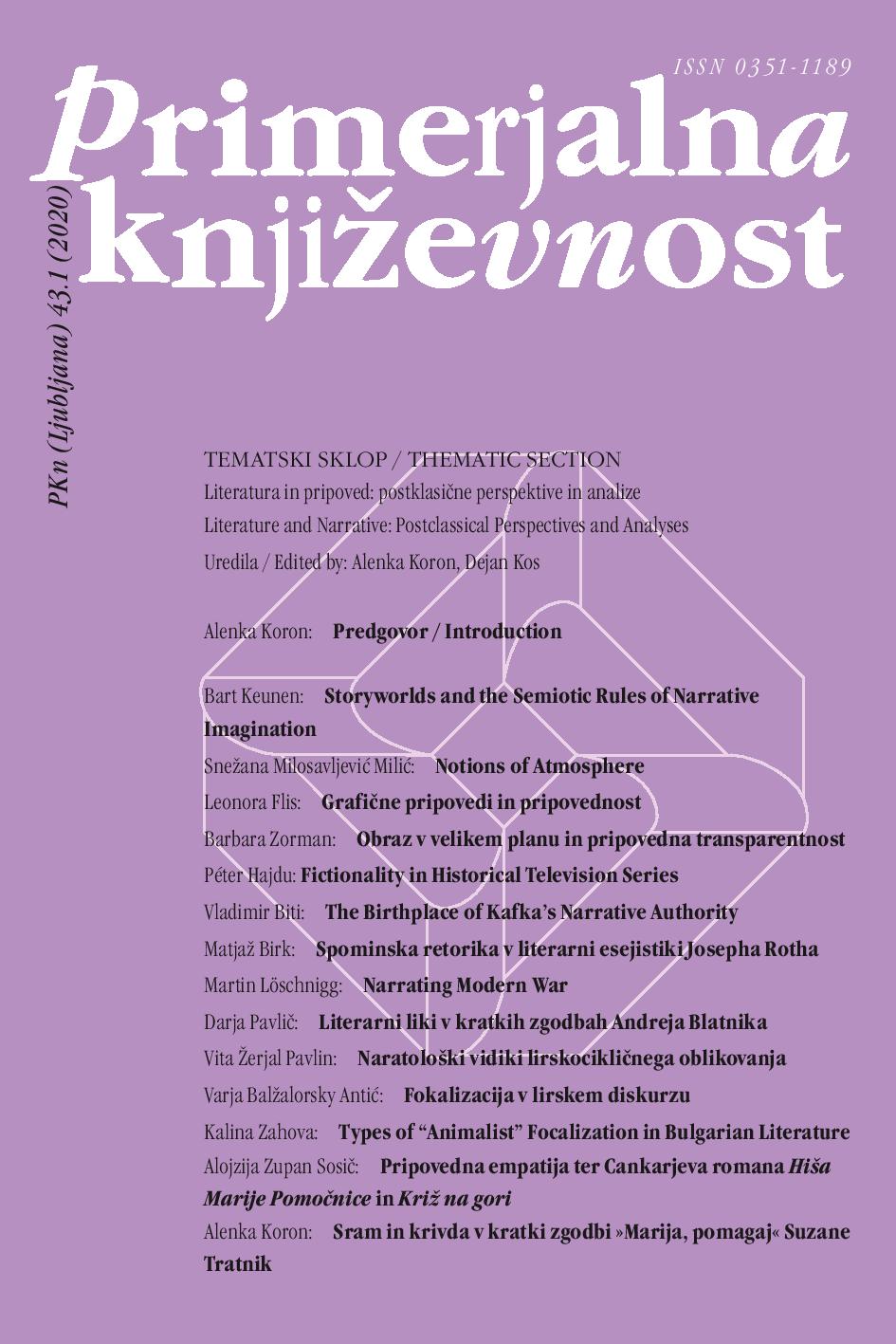Fikcijskost v zgodovinskih televizijskih nadaljevankah
DOI:
https://doi.org/10.3986/pkn.v43.i1.05Ključne besede:
zgodovinski roman, televizijske nadaljevanke, fikcijskost, realizem, dokumentarnost, anahronizem, Rim, OglaševalciPovzetek
Najočitnejša formalna lastnost zgodovinskega romana kot žanra, ki ga je vzpostavil Walter Scott, je dvojnost fiktivne zgodbe v ospredju in zgodovinsko potrjenega ozadja. Dogajališča mnogih televizijskih nadaljevank so zgodovinska, mnoge od nadaljevank je mogoče videti kot zgodovinske romane. Televizijska serija Rim (2005–2007) je ohranila nekaj scottovske strukture, značilne za izpostavljeno fikcijsko zgodbo. Zgodba o Pulosu in Vorenusu je fikcijska in uprizarja življenje preprostih ljudi, zgodovinski liki, kot so Julij Cezar in Pompej ali Antonij in Avgust, pa ne nastopajo zgolj kot na zgodovinskih dejstvih temelječe ozadje. Razmerje med fikcijskimi in nefikcijskimi zgodbami je uravnoteženo, in kot tako ponuja živ in prepričljiv vpogled v preteklost. Mnogim zgodovinskim nadaljevankam preteklost služi zgolj kot dekorativno prizorišče za zgodbe, polne intrig, nasilja in seksa (Tudorji, Borgijci), predstavljene kot zgodovinske (anti)romance, ki pa se osredotočajo zgolj na elito. Zgodovinski roman druge vrste pa so ustvarile nekatere nadaljevanke, ki (navidez s povsem drugega konca) celo iz ozadja izključijo vsa zgodovinska dejstva in predstavijo vsakdanjost navadnih ljudi v njeni (kvazi)historični drugosti. V nadaljevankah kot Mad Men in The Knick denimo ni omenjen noben političnozgodovinski dogodek, prav tako se v ozadju ne pojavi nobena zgodovinska osebnost, vendar pa te uspešno predstavljajo drugost preteklosti z gledišča javnega diskurza o vprašanjih rase, spola in celo morale, fenomenov, ki jih je mogoče videti kot razvoj nove vrste historičnega romana, spodbujene s historiografskimi ideali dvajsetega stoletja.
Literatura
Almagor, Eran. “Earning Immortality: Cicero’s Death Scene in Rome.” Rome, Season Two: Trial and Triumph. Ed. Monica S. Cyrino. Edinburgh: Edinburgh University Press, 2015. 61–73.
Assmann, Jan. “Communicative and Cultural Memory.” The Theoretical Foundations of Hungarian “lieux de Mémoire” Studies. Ed. Pál S. Varga, Karl Katschthaler, Donald E. Morse, and Miklós Takács. Debrecen: Csokonai Kiadó, 2013. 36–43.
Bianco, Robert. “Rome Goes into Decline.” Usatoday.com 11 Jan. 2007. Web. 12 Jan. 2020.
Briggs, Ward. “Latin in the Movies and Rome.” Rome, Season One: History Makes Television. Ed. Monica S. Cyrino. Malden: Blackwell, 2008. 193–206.
Cyrino, Monica S. “Introduction.” Rome, Season One: History Makes Television. Ed. Monica S. Cyrino. Malden: Blackwell, 2008. 1–10.
Cyrino, Monica S. “Atia and the Erotics of Authority.” Rome, Season One: History Makes Television. Ed. Monica S. Cyrino. Malden: Blackwell, 2008. 130–140.
Futrell, Alison. “‘Not Some Cheap Murder’: Caesar’s Assassination.” Rome, Season One: History Makes Television. Ed. Monica S. Cyrino. Malden: Blackwell, 2008. 100–116.
Goodlad, Lauren M. E. “The Mad Men in the Attic: Seriality and Identity in the Modern Babylon.” Mad Men, Mad World: Sex, Politics, Style and the 1960s. Eds. Lauren M. E. Goodlad, Lilya Kaganovsky, and Robert A. Rushing. Durham: Duke University Press, 2013. 320–344.
Greif, Mark. “You’ll Love the Way It Makes You Feel.” London Review of Books 23 Oct. 2008. Web. 12 Jan. 2020.
Haynes, Holly. “Rome’s Opening Titles: Triumph, Spectacle, and Desire.” Rome, Season One: History Makes Television. Ed. Monica S. Cyrino. Malden: Blackwell, 2008. 49–60.
Hutcheon, Linda. The Poetics of Postmodernism. London: Routledge, 1988.
Joyrich, Lynne. “Media Madness: Multiple Identity (Dis)Orders in Mad Men.” Mad Men, Mad World: Sex, Politics, Style and the 1960s. Eds. Lauren M. E. Goodlad, Lilya Kaganovsky, and Robert A. Rushing. Durham: Duke University Press, 2013. 213–259.
Lang, Clarence. “Representing the Mad Margins of the Early 1960s: Northern Civil Rights and the Blues Idiom.” Mad Men, Mad World: Sex, Politics, Style and the 1960s. Eds. Lauren M. E. Goodlad, Lilya Kaganovsky, and Robert A. Rushing. Durham: Duke University Press, 2013. 73–91.
Lukács, Georg. The Historical Novel. Trans. Hannah and Stanley Mitchell. London: Merlin, 1989.
Milnor, Kristina. “What I Learned as an Historical Consultant for Rome.” Rome, Season One: History Makes Television. Ed. Monica S. Cyrino. Malden: Blackwell, 2008. 42–48.
Ono, Kent. “Mad Men’s Postracial Figuration of a Racial Past.” Mad Men, Mad World: Sex, Politics, Style and the 1960s. Eds. Lauren M. E. Goodlad, Lilya Kaganovsky, and Robert A. Rushing. Durham: Duke University Press, 2013. 300–319.
Polan, Lana. “Maddening Times. Mad Men in Its History.” Mad Men, Mad World: Sex, Politics, Style and the 1960s. Eds. Lauren M. E. Goodlad, Lilya Kaganovsky, and Robert A. Rushing. Durham: Duke University Press, 2013. 42–60.
Solomon, Jon. “Televising Antiquity: From You Are There to Rome.” Rome, Season One: History Makes Television. Ed. Monica S. Cyrino. Malden: Blackwell, 2008. 11–28.
Szegedy-Maszák, Mihály. “A történelmi regény létezési módja.” Műfaj és komparatisztika. Eds. Dorottya Szávai and Zoltán Z. Varga. Budapest: Gondolat, 2016. 57–67.
Toscano, Margaret M. “Gowns and Gossip: Gender and Class Struggle in Rome.” Rome, Season One: History Makes Television. Ed. Monica S. Cyrino. Malden: Blackwell, 2008. 153–167.
Weiden Boyd, Barbara. “Becoming Augustus: The Education of Octavian.” Rome, Season One: History Makes Television. Ed. Monica S. Cyrino. Malden: Blackwell, 2008. 87–99.
Wright, Andrew. “The Death of Cicero: Forming a Tradition: The Contamination of History.” Historia 50 (2001): 436–452.
Zoller Seitz, Matt. Mad Men Carousel: The Complete Critical Companion. New York: Abrams, 2015.


